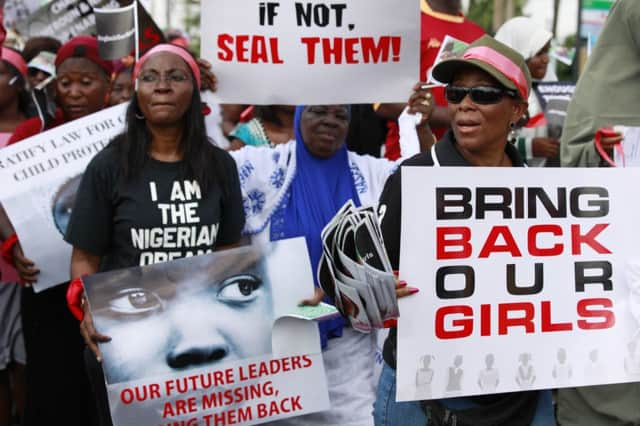Leaders: Cool nerves needed in Nigeria crisis


Yesterday came reports that a further eight girls had been kidnapped in the same region by militants who – like the Taleban gunmen who shot schoolgirl Malala Yousafzai in Pakistan in 2012 – seem to have a visceral hatred of the idea of women receiving a formal education.
This is repugnant thinking that has no place in the modern world. But the blinkered religious fundamentalism from which it gains its perverse legitimacy is not one that is easily countered.
Advertisement
Hide AdAdvertisement
Hide AdIt is especially hard to address in any practical way from the standpoint of the secular – or Christian – West. Yesterday the United States promised the Nigerian authorities any help they needed in locating the girls and making them safe. That message was echoed by William Hague, the Foreign Secretary.
These offers are welcome. But at this stage it is difficult for the governments of the West to do more. The last thing this crisis needs is any sense that efforts to track down and retrieve the girls is in any way motivated by anything more than a deep and sincere concern for their safety. The last thing anyone needs is for this to be seen as a culture clash between the West and Islam.
This is why any actual intervention on the ground on behalf of the Nigerian authorities has to come from moderate Islamic nations. Only they can ensure that a move against Boko Haram does not spark a wider and even more distressing chain of events in the Borno region in the north-east of the country.
In this, there is surely a role for the United Nations in brokering the kind of international co-operation that could see Nigeria’s government get the specialist support it requires in addressing and resolving this crisis.
If the situation takes a darker turn, there may be justification for more direct involvement from the West – a clear and pressing threat to the girls’ safety may demand a less cautious response. But for now, a measured and, above all, Islamic-led approach is what is required.
Speed, however, is of the essence – there are reports of the schoolgirls being dispersed into smaller groups and some of them taken across borders into neighbouring countries, perhaps as a result of the Boko Haram leader Abubakar Shekau acting on his declared intention of selling them as “wives”. This is not encouraging news.
The situation on the ground is a complex one. The Boko Haram kidnappings are in part a response to the Nigerian authorities’ decision to detain some of the extremists’ own family members, including wives and children. The perils of an all-out rescue bid in such a remote location – or locations – are obvious. This crisis will take cool nerve but every effort must be made for the girls’ safe return.
Market forces will ultimately decide
AS AMERICAN pharmaceutical giant Pfizer closes in on its British take-over target AstraZeneca, so the calls increase for government intervention to protect jobs and research capabilities. Labour’s shadow business secretary, Chuka Umunna, has been particularly vocal in asking ministers to use all available powers to protect Britain’s national interests.
Advertisement
Hide AdAdvertisement
Hide AdMr Umunna’s call already has a somewhat futile ring about it. There is an element of familiarity about the political point-scoring around the Pfizer bid. We have been here many times before, in many other takeovers down the years, and no-one is in much doubt about the likely outcome.
This is, at root, a decision for two groups of shareholders in an open market. They will decide the future of these two firms, and there is little that a government can – or arguably should – do to impede them.
In the run-up to the UK general election next spring, Labour is keen to distinguish itself from the Tories by refusing to be buffeted by the vagaries of capitalism. Ed Miliband’s argument is that when the market does not deliver true competition, the state must intervene.
In some areas – especially consumer-facing utilities – there is some considerable scope for a new approach that puts the customer’s interest first. In big multinational takeovers, this is less true.
Of course, assurances can be sought on protecting jobs and important research facilities, and incentives in the form of tax breaks can be offered. But, ultimately, there is little that can be done to ensure British companies remain British.